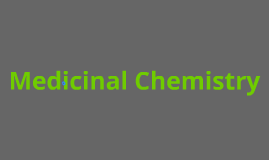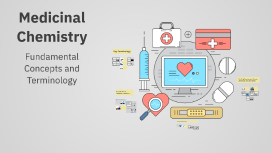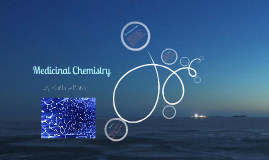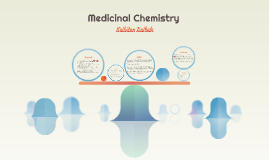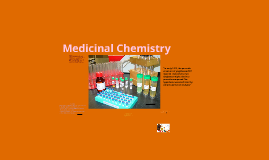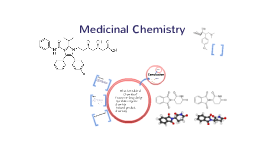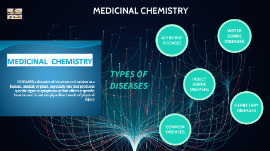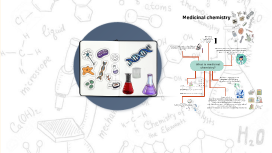Medicinal Chemistry
Transcript: Medicinal Chemistry Key Terminology Active Pharmaceutical Ingredient (API) Pharmacophore Structure-Activity Relationship (SAR) An Active Pharmaceutical Ingredient (API) is the substance in a pharmaceutical drug that is biologically active. APIs produce the intended effects in patients and are critical components that differentiate between generic and brand-name drugs. A pharmacophore is the arrangement of atoms or groups in a molecule that is essential for biological activity. It represents the minimal structural features necessary to ensure interaction with a biological target, often guiding drug design. The Structure-Activity Relationship (SAR) refers to the relationship between a drug's chemical structure and its biological activity. Understanding SAR helps medicinal chemists optimize drug efficacy and minimize adverse effects during drug design. Bioavailability Pharmacokinetics Drug Metabolism Drug metabolism involves the chemical alterations of a drug by the body, primarily through enzymatic reactions. Understanding metabolism is crucial for predicting drug interactions, efficacy, and safety profiles. Bioavailability is the fraction of an administered dose of unchanged drug that reaches systemic circulation. It is a critical factor affecting drug efficacy, as variations can lead to differences in therapeutic outcomes among patients. Pharmacokinetics is the study of how drugs move through the body over time, encompassing absorption, distribution, metabolism, and excretion (ADME). This field helps determine dosing regimens and timing for optimal therapeutic effect. Toxicology Fundamental Concepts and Terminology Toxicology is the study of the adverse effects of chemical substances on living organisms. It encompasses biochemical mechanisms of action and evaluation of potential risks involved with drug exposure, which is paramount in drug safety assessment. The Drug Development Process: Challenges and Innovations Preclinical Trials Clinical Trials Phases Preclinical trials assess the safety and biological activity of drug candidates using in vitro (test tube) and in vivo (animal) studies. These trials are crucial to determine dosage and potential toxic effects prior to progressing to human trials. Clinical trials include four phases: Phase I focuses on safety; Phase II assesses efficacy and side effects; Phase III involves large populations for thorough data; Phase IV monitors long-term effects after approval. Each phase is essential for ensuring patient safety and drug efficacy. Introduction to Medicinal Chemistry Post-Market Surveillance Regulatory Approval Post-market surveillance monitors a drug's safety after approval, gathering data on long-term effects and rare side effects in diverse populations. This process helps ensure ongoing patient safety and can lead to label changes or recalls if needed. Regulatory approval by agencies like the FDA is crucial for drug market entry. A New Drug Application (NDA) must provide comprehensive data from all trial phases, ensuring the drug’s safety and effectiveness before it reaches consumers. Future Trends in Medicinal Chemistry Future trends include personalized medicine utilizing genetic information, AI-driven drug design enhancing efficiency, and increased emphasis on sustainability in drug development. These innovations promise to revolutionize therapeutic options and treatment outcomes. What is Medicinal Chemistry? Medicinal chemistry is the discipline that combines diverse scientific disciplines to discover and develop new drugs. It focuses on the design and chemical synthesis of compounds that demonstrate biological activity against diseases. Historical Context The field of medicinal chemistry has evolved since the 19th century, beginning with the discovery of aspirin. Key milestones include the development of penicillin and modern synthetic methods to enhance drug efficacy. Why is it Important? Who are Medicinal Chemists? It's crucial in drug development as it bridges the gap between chemistry and pharmacology. Medicinal chemists optimize compounds for effectiveness, safety, and chemical properties, effectively meeting patient needs. Medicinal chemists are scientists who specialize in designing and synthesizing pharmaceutical compounds. They collaborate in interdisciplinary teams to ensure that new drugs are viable from both chemical and biological perspectives. Design and Discovery High-Throughput Screening Lead Compounds High-throughput screening (HTS) allows researchers to rapidly evaluate thousands of compounds for biological activity. This technique streamlines the drug discovery process, enabling the identification of active lead compounds from large compound libraries. Structure-Based Drug Design Lead compounds serve as starting points for drug development, possessing desirable biological activities. The identification and optimization of lead compounds can significantly enhance the therapeutic efficacy and minimize toxicity in the drug design






